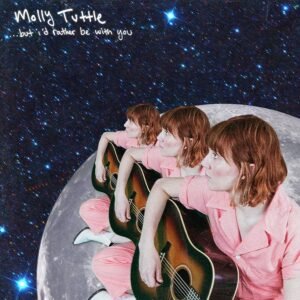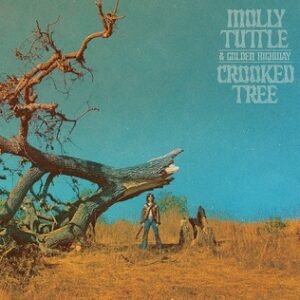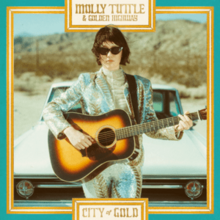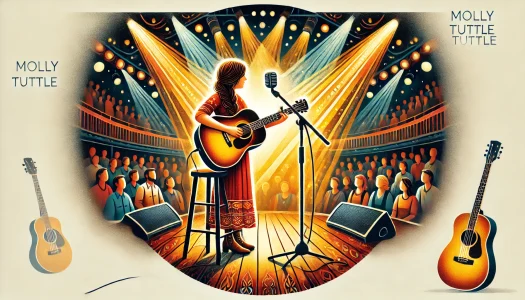In a genre rooted in tradition, Molly Tuttle stands as a beacon of innovation and virtuosity. With her crystalline voice, impeccable songwriting, and groundbreaking guitar technique, Tuttle has carved a space for herself that transcends the boundaries of bluegrass while honoring its storied past. The first woman to win the International Bluegrass Music Association’s “Guitar Player of the Year” award, she shattered ceilings with the same ease she executes a flawless flatpicking run. But Molly Tuttle is more than her accolades; she is a storyteller at heart, weaving threads of folk, Americana, and roots music into a tapestry that feels both timeless and urgent.
Background
Early Life
Molly Tuttle was born into a world where music was as essential as air. Raised in Palo Alto, California, she grew up in a family of musicians deeply entrenched in the bluegrass tradition. Her father, Jack Tuttle, a renowned music teacher and multi-instrumentalist, was her first mentor, introducing her to the guitar when she was just eight years old. The family home was filled with the sounds of bluegrass jams and old-time fiddle tunes, fostering a love for storytelling through song that would become the cornerstone of Molly’s artistry.
Despite growing up in the tech-saturated environment of Silicon Valley, Tuttle’s world revolved around acoustic instruments and traditional music. Her childhood was marked by hours spent practicing and playing alongside her father and siblings, honing a deep understanding of melody, harmony, and the intricate interplay that defines bluegrass. Even as a young girl, Molly displayed an innate ability to interpret music with a maturity far beyond her years.
Musical Beginnings
Molly’s first forays into performance came early. By the age of 11, she was playing in her family’s band, developing the stage presence and confidence that would later define her career. Her early performances at bluegrass festivals across California gave her a taste of the communal spirit that lies at the heart of the genre. At 13, Molly recorded her first album, The Old Apple Tree, with her father—a collection that showcased not only her burgeoning skills but also her respect for tradition.
As she grew older, Tuttle sought to refine her craft further. She enrolled at the Berklee College of Music in Boston, where she immersed herself in the study of music theory, composition, and performance. Berklee was a transformative experience, broadening her musical horizons and exposing her to new ideas. It was here that Molly began to blend the rootsy authenticity of bluegrass with a broader palette of influences, setting the stage for her unique approach to the genre.
Artistic Influences
Molly Tuttle’s sound is a rich mosaic of influences that span genres and generations. She cites Doc Watson as one of her earliest and most enduring inspirations, particularly for his pioneering flatpicking style. Watson’s ability to blend technical precision with emotional warmth is echoed in Tuttle’s own guitar work. Another key influence is Gillian Welch, whose introspective songwriting and evocative storytelling deeply resonated with Molly as she developed her lyrical voice.
Tuttle has also drawn inspiration from outside the bluegrass sphere. The fingerstyle techniques of folk guitarists like John Fahey, the boundary-pushing ethos of Americana stalwarts like Chris Thile, and even the melodic sensibilities of pop artists have all shaped her artistic vision. This eclectic mix of influences has allowed Tuttle to transcend genre labels, creating a sound that feels both rooted in tradition and refreshingly contemporary.
A Journey Through Her Albums
1. When You’re Ready (2019)

Molly Tuttle’s debut solo album, When You’re Ready, marked her official arrival as a trailblazer in contemporary roots music. The record showcased her ability to balance technical mastery with emotional resonance, featuring a collection of songs that leaned more toward Americana and folk-pop than traditional bluegrass. Tracks like “Take the Journey” and “Light Came In (Power Went Out)” demonstrated her intricate guitar work and introspective lyricism, while the lush production highlighted her crystalline voice. This album was a declaration of artistic independence, proving that Tuttle could craft deeply personal, genre-defying music while remaining grounded in her bluegrass roots.
2. …but i’d rather be with you (2020)

A creative pivot born of the pandemic, …but i’d rather be with you saw Tuttle exploring her eclectic musical influences through a series of covers. Recorded during quarantine, the album features stripped-down reinterpretations of songs by artists ranging from The Rolling Stones (“She’s a Rainbow”) to Rancid (“Olympia, WA”). The project revealed the breadth of Tuttle’s musical curiosity and adaptability, as she infused these tracks with her signature flatpicking style and emotional sincerity. Highlights like her version of the Grateful Dead’s “Standing on the Moon” reimagined familiar classics in ways that felt both intimate and inventive.
3. Crooked Tree (2022)

With Crooked Tree, Tuttle returned to her bluegrass roots in spectacular fashion. Co-produced with dobro virtuoso Jerry Douglas, the album is a love letter to the genre that first shaped her. Featuring a host of guest appearances from bluegrass heavyweights like Billy Strings, Sierra Hull, and Old Crow Medicine Show, Crooked Tree blends traditional instrumentation with Tuttle’s modern songwriting sensibilities. Tracks like the title song “Crooked Tree” and “Big Backyard” celebrate individuality and community, while “Dooley’s Farm” and “San Francisco Blues” add a playful narrative flair. This Grammy-winning album solidified her reputation as a torchbearer for bluegrass, honoring its legacy while infusing it with fresh vitality.
4. City of Gold (2023)

Tuttle’s latest album, City of Gold, sees her further pushing the boundaries of bluegrass with a bold and vibrant approach. Produced in collaboration with her band, Golden Highway, the record explores themes of wanderlust, resilience, and self-discovery. Songs like “El Dorado” and “Next Rodeo” feature breathtakingly fast-paced picking and intricate harmonies, while “Down Home Dispensary” offers a humorous take on modern life in rural America. City of Gold cements Tuttle’s status as a modern-day pioneer, blending virtuosic musicianship with lyrics that feel both deeply personal and universally relatable.
Industry Perspective
Challenges and Triumphs
Molly Tuttle’s rise in the music industry has been a journey of breaking barriers and overcoming obstacles. As a woman in the traditionally male-dominated bluegrass genre, she faced the implicit biases that often accompany the territory. Early in her career, it wasn’t uncommon for audiences to express surprise at her virtuosity on the guitar, a skill historically associated with male players in the genre. However, Tuttle used these moments as motivation, consistently proving that talent knows no gender.
Another hurdle came in the form of her health. At a young age, Tuttle was diagnosed with alopecia universalis, a condition that causes total hair loss. This presented challenges not only in terms of self-image but also in navigating an industry where appearance can carry outsized importance. Tuttle, however, embraced her uniqueness, using it as an opportunity to connect with fans on a deeper, more personal level. Her openness about her journey has made her an inspiring figure for many.
Through determination and an unwavering commitment to her craft, Tuttle has turned challenges into triumphs, carving out a space where she can authentically express herself and lead by example for future generations.
Collaborations and Connections
Molly Tuttle’s career is richly defined by her collaborative spirit. Her ability to connect with other artists has not only enriched her sound but also amplified her influence across genres. A notable partnership is with dobro maestro Jerry Douglas, who co-produced her bluegrass-focused Crooked Tree. The album also features luminaries like Billy Strings and Sierra Hull, highlighting her ability to assemble and inspire an ensemble of elite talent.
Beyond studio collaborations, Tuttle is a member of the thriving Americana and roots music communities. Her friendships with artists like Ketch Secor of Old Crow Medicine Show and bluegrass powerhouse Becky Buller have led to shared performances and creative exchanges that continue to expand her musical horizons. Her work with her band, Golden Highway, showcases her knack for fostering a cohesive yet dynamic sound, balancing individual brilliance with collective harmony.
Tuttle has also contributed to broader collective efforts in the industry, including participation in tribute albums and benefit concerts. These connections have cemented her status as both a leader and a collaborator in the contemporary music landscape.
Recognition and Achievements
Molly Tuttle’s list of accolades and achievements reflects her impact on both bluegrass and the wider music world. In 2017, she made history as the first woman to win the International Bluegrass Music Association (IBMA) Guitar Player of the Year award, a title she would reclaim in subsequent years. Her groundbreaking win not only celebrated her individual talent but also signaled a shift toward greater inclusivity in the genre.
In 2023, Tuttle’s Crooked Tree won the Grammy Award for Best Bluegrass Album, a milestone that underscored her status as a torchbearer for the genre. The album received widespread critical acclaim, with praise for its fresh approach to bluegrass while honoring its roots.
Her music has also resonated with a broader audience, earning spots on year-end best-of lists from outlets like Rolling Stone and NPR. Tuttle’s tours, whether headlining or sharing the bill with Americana heavyweights, continue to sell out, further solidifying her place as a must-see live performer.
Impact and Legacy
Cultural Significance
Molly Tuttle’s influence on bluegrass and acoustic music extends far beyond her technical prowess and groundbreaking accolades. By blending traditional elements with a modern sensibility, she has redefined the possibilities of what bluegrass can be, attracting a younger, more diverse audience to the genre. Tuttle’s work challenges the notion that bluegrass is bound to the past, positioning it instead as a living, breathing art form capable of growth and reinvention.
Her role as a trailblazer for women in bluegrass is particularly significant. By becoming the first woman to win the IBMA Guitar Player of the Year award, she not only opened doors for herself but also paved the way for future generations of female musicians to break into spaces historically dominated by men. Through her authenticity and innovation, Tuttle has become a cultural ambassador for roots music, proving its relevance and adaptability in an ever-changing musical landscape.
Fanbase and Community
Molly Tuttle’s connection with her fans is rooted in authenticity and relatability. Her openness about personal struggles, such as living with alopecia universalis, has resonated deeply with listeners who see her as a source of strength and inspiration. This vulnerability has helped her cultivate a loyal fanbase that values not just her music but also the person behind it.
The community around Tuttle is vibrant and multi-generational, encompassing bluegrass traditionalists, indie-folk enthusiasts, and newcomers to roots music. At her shows, it’s not uncommon to see a mix of old-school bluegrass fans and young, progressive music lovers, all united by her captivating performances and inclusive spirit. Social media has also played a key role in fostering this connection, with Tuttle frequently sharing behind-the-scenes glimpses into her creative process and engaging with fans directly.
Looking Forward
As Molly Tuttle continues to push creative boundaries, the future of her career looks exceedingly bright. Her ability to evolve while staying true to her roots suggests she has only begun to explore the depths of her artistic potential. With the momentum of her Grammy win and critical acclaim for albums like Crooked Tree and City of Gold, Tuttle is poised to further expand her influence, potentially collaborating with artists outside the bluegrass and Americana genres to explore new sonic territory.
Her legacy, however, is already taking shape. Molly Tuttle will likely be remembered as one of the most important figures in modern bluegrass, an artist who honored the genre’s past while charting an exciting course for its future. Beyond her music, her impact as a role model—particularly for young women in roots music—ensures her contributions will echo for generations to come.
